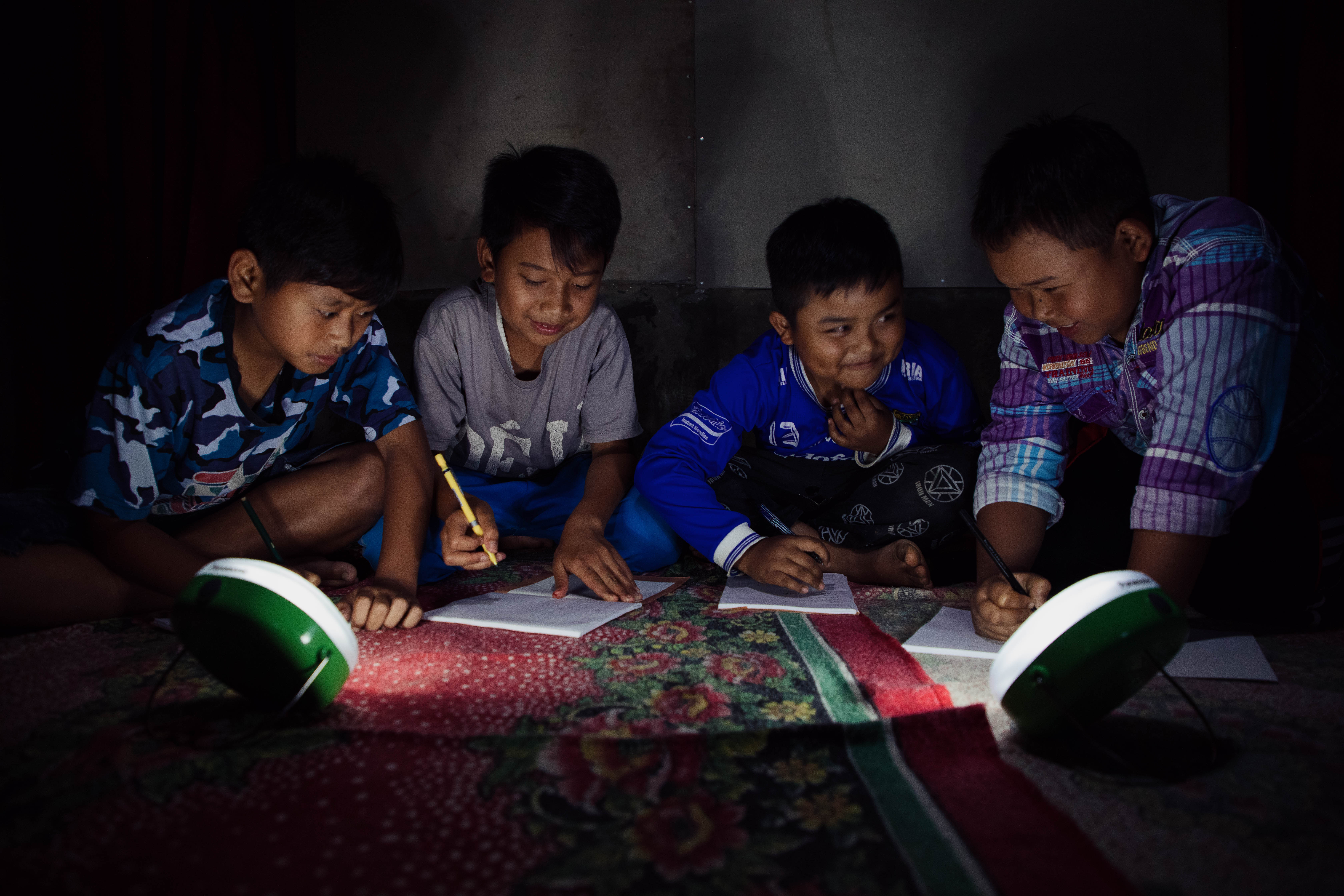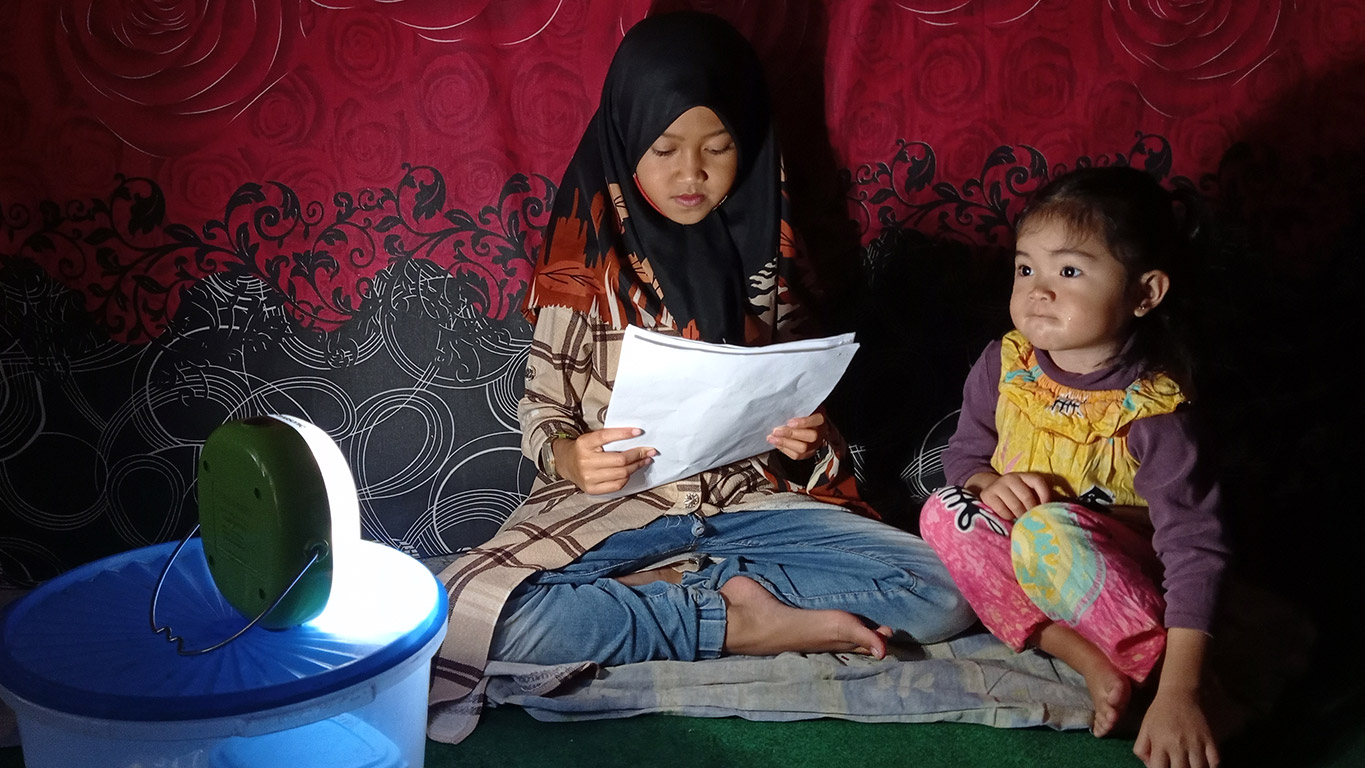Bringing Light to Support Students' Learning: One Year Later
- Sharing :
- Tweet

Roughly, there are 840 million people still living in the planet without electricity (source: The Energy Progress Report). Access to infrastructure is one of the basic requirement for the development of an economy in developing countries. It holds its importance especially in the context of rural areas which are generally lagged behind. There are different elements which constitute infrastructure such as water, sanitation, electricity, health, telecommunication, roads etc. While each one contribute in achieving the overall development of a country, access to electricity is considered to be a key requirement for poverty reduction by enabling the creation and improvement of income generating activities.
In West Java, more than 60 percent of children experience multi-dimensional child poverty. As part of YUM's education program, one of the challenges we face comes when the learning process continues at home. The lack of parents' support and an unfavourable learning environment contributes to the students inability to progress in their studies. Due to poverty, most of the families in Cipanas live in a rented house with limited access to light during the day and limited access to electricity at night. This condition forces the students to rush their studying and for the adults to only work in the daylight. Therefore for the students to study at home is not an option. This is a challenge for the students since they have assignments to do and reviews for tests and exams.
In February 2020, YUM partnered with Panasonic and ONE Championship to bring 100 solar lanterns to Cibadak Village. 100 students were selected to receive the solar lanterns. These solar lanterns are primarily used to support the students in their home learning activity in the evening.

Before they received the solar lanterns, the students had to wake up early the next morning and find time before the class started to work on their assignment. The younger students in Cipanas rely on their parents to help them with their schoolwork. Sometimes, the parents are only able to help them in the evenings after they finish their work.
The impact of the solar lanterns amidst the devastating COVID-19 pandemic
The year 2020 has been very challenging, not only health wise but also for family finances especially in rural areas of Indonesia. Many of the breadwinners in Cipanas have lost their jobs and struggle to provide food for their family. Some have even asked their children to work to support their family. The solar lanterns have proven to help with family finances because not having to pay for electricity is one less cost for the families who are already struggling.
45 million students in Indonesia are studying from home during the pandemic. It is worth noting that during this pandemic, the solar lanterns became more essential for the students than ever. Moreover, other family members have also benefitted from the solar lanterns to do their housework or support their home business, particularly in this pandemic, with many households starting new businesses from home.
The profound impact on the students’ education
Six months after the lanterns were distributed, out of the 100 students, 90 have continued their education to a higher level. Eight students have graduated from high school. Out of the eight who have graduated; seven are currently looking for a job and one is planning to continue to university.
Below are several stories from the field, as told by the students who have been using the solar lanterns for more than a year now:

“Both of my parents are working and spending most of their time outside the house. I am responsible for taking care of my home and my little sister. I use the lamp for many activities, such as studying, reading, cooking, and others." Safitri, 3rd-grade, Cipanas Village

"I live in a house with 12 other family members. The solar lamp has been a great help for me in studying and doing other activities at night. My sister in law sells fried snacks in the morning; therefore, she needs to cook her food products in the early morning. The light in our kitchen is minimal; hence this lamp is also beneficial for her. Especially when the electricity is off, I can continue working on my homework and study." Hernawati, 9th-grade, Cipanas Village
The impact of the solar lanterns have been significant for the students in the community. Having a very low level of education means only being able to obtain informal or seasonal work with very little income. We hope the lanterns will motivate the students and give them the opportunity to continue learning at home, further their education, continue their growth and development, and reach for the highest level of education possible. Consequently, it is our hope that the students can get a prosperous career when they reach adulthood, which in turn can help provide for better health services and education for their families.
- Sharing :
- Tweet
